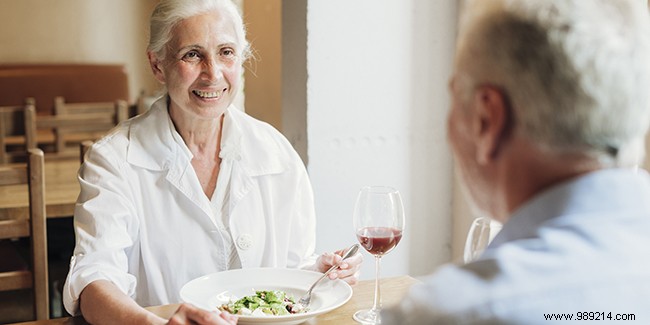
Lack of appetite affects the elderly, especially after 75-80 years, with a risk of malnutrition which can have serious consequences on their health. Loss of appetite is explained by organic causes, inherent to aging, but also by psychological causes. However, seniors need balanced nutrition, rich in protein in particular, and in sufficient quantities to stay in shape. Our recommendations to remedy the lack of appetite with age.
One of the causes of loss of appetite in the elderly is organic. With age, the taste buds present in the mouth change and change the tastes of food. In addition, as you age, the number of taste buds decreases, by at least a third compared to a young person.
Medicines also participate in the transformation of these taste buds which play an important role in food. The more drugs you take, the more they are altered. The treatments taken in case of cardiovascular diseases (hypertension, heart problems, etc.) which most often affect seniors are those which modify the taste buds in the mouth and therefore the taste the most.
In general, all diseases, and in particular Alzheimer's or Parkinson's disease, which are more often suffered by seniors, have an impact on appetite. In particular, they have the effect of reducing the amount of saliva in the mouth and therefore modify the taste of food. Dental appliances, and more generally oral infections or diabetes, also tend to alter the flavor of food and can cause a loss of appetite.
The slowing down of digestion, due in particular to the reduction in the capacity of the stomach, the reduction in the activity of the intestine or even the liver, also has the consequence in the elderly of ingesting lesser quantities of food and thus promote loss of appetite. Some diseases that affect the brain can also have negative effects on digestion.
Finally, the lack of physical activity in the elderly also acts on their energy expenditure which decreases and ultimately reduces their food needs and their appetite.
The psychological aspect is not to be neglected to explain the loss of appetite in the elderly. Many of them suffer from loneliness, lack of social ties and suffer from depression. This disease plays an important role in the lack of appetite. The person who suffers from it loses all desire to indulge themselves, especially with a pleasant and attractive diet.
Food rhymes with conviviality. However, many elderly people suffer from loneliness and are most often alone to eat their meals. They no longer take pleasure in preparing them and their diet becomes monotonous, less appetizing.
We know that food that is not varied contributes to no longer stimulating taste and therefore appetite. In order to fight against the loss of appetite with age, it is therefore important to continue to eat a diversified diet that promotes the sensations of flavors and makes you want to eat. On the other hand, it is also advisable to spice up your dishes, with spices or herbs for example, to also stimulate the taste. Finally, favoring meals together, at home with family or friends, in restaurants, greatly contributes to the pleasure of eating and therefore to stimulate the appetite.
In order to stimulate the appetite of the elderly who have lost it, it is recommended first to carry out a complete health check, but also psychological and in connection with their family situation. This assessment makes it possible to offer them an adapted diet, which gives them back the desire and the pleasure of eating, and above all adapted to their tastes, their desires and their living conditions.
It is preferable to offer an elderly person who lives alone, for example, simple dishes to prepare, but also foods that are easy to chew and digest. It is also advisable to rather increase the nutrient content of foods served to a senior, by adding olive oil, avocado, etc., than to increase the quantities. The entourage can thus prepare meals in small quantities to freeze that the senior can consume according to his needs.
Appropriate nutrition that restores appetite also means setting regular meal times in order to respond in a timely manner to the signs of hunger sent by the body.